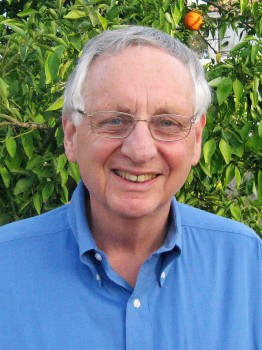Haverford Conversation: Professor Emeritus of Political Science Sidney Waldman

Details
Since his retirement from Haverford College in 2011, Professor Emeritus of Political Science Sidney Waldman has contemplated ways to facilitate ethics and compassion. The lack of those ideals in the American public were themes of his book, America and the Limits of the Politics of Selfishness, which came out in 2007. In the last eight years, Waldman, 75, has spent his time researching the intersection of religion, philosophy, and evolutionary theory to shed additional light on ways to encourage ethics and compassion. Earlier this year, Waldman, who has published extensively in the field of political science over his 45-year academic career, self-published his fifth and sixth books, The God in Us and What Is God in Us? The books, sparked in small part by an“experience of the divine” he had as a young man, present in Socratic style his reasoning around how one knows God—by looking within, he concludes—and the importance of harnessing that inner power to do good. Writer Lini S. Kadaba talked with the Tucson, Ariz., resident about his avocation, religion, and God's and our role in universal love and justice.
Lini Kadaba: When you were 19 years old and a freshman at Oberlin College, you had a profound“experience of the divine,” as you call it. What happened and how did it affect you?
Sidney Waldman: I had gone back to my dorm room. I remember feeling just a little down. I had lain down on a bed. All of a sudden, I became aware of a light in the room. Besides the light, … there was a very clear communication, though there was no face or no voice. [It] was an experience I would call an embracing love—which I had never experienced up to that time nor have I experienced since then—and secondly, a message that everything would be OK. It lasted for a few minutes, and then it was gone. There was no doubt in my mind at the time, frankly nor since, that this was an experience of the divine. I, of course, wondered if I could have created the experience I had. It is inconceivable to me that I could have created this sense experience.
I was so freaked out by this experience. … It was so otherworldly. For a long time—about 20 years—I shared it with only one person. I basically continued along the path I was already on. For a long time, I did not see any connection between how I spent my life and that experience. It was literally after decades, that I realized one reason I so enjoyed what I was doing at Haverford was that I was trying to serve the students in my classes. … I was trying to help them recognize their own abilities. I now realize that this serving of others is absolutely bound with the experience of love that I had.
LK: Why did you decide to write The God in Us and What Is God in Us?
SW: When you have an experience like mine, in the end, you don't hide it in a corner of some room. Secondly, I believe religion and philosophy are relevant. Every religion has at its core compassion, every one. … The reason I like religion and philosophy is because I think they deal with the largest questions in life. At age 75, you're interested in the biggest questions in life.
LK: Was researching and writing The God in Us and What Is God in Us? different from your academic work?
SW: I spent my life using reason and critical thinking and analysis, and I'm still doing that. It's just that the subject has changed. Science is not the only way of knowing. It's good for some things but not everything. … You don't get to God entirely by reason. The kind of certainty you can get in logic and science, you cannot get in these fields.
LK: What is the message of your books?
SW: Ultimately, the message of the books, again and again, is look within because I think God is our ethics and compassion, our higher reason. I'm urging people to look within … and then to act upon it. It takes will to look inside and will to act. … Ultimately, the purpose is action. What is life about? Why are we here? For me, it's not about what happens after death. It's what happens during life.
LK: What's next for you?
SW: I've already begun working on another project. When you talk about love and justice, as I do, people inevitably ask: What about evil? What about people who do evil acts? I've begun work on the problem of evil. The purpose is to reduce it, reduce its frequency, and to decide what to do when, inevitably, it occurs.
LK: You were born a Jew and consider yourself Jewish. Has working on these projects made you more religious?
SW: I'm a believer. I consider myself a religious person. I'm not a person who attends a lot of religious services. I do religion seven days a week because I work on this stuff seven days a week. The reading and writing and thinking are my prayer. Praying for me, being religious for me, is the work. It always was.
Waldman's books are available through Amazon and on Kindle at The God in Us and What Is God in Us? To see a YouTube video of him speaking on "An Experience of the Divine," click here.



